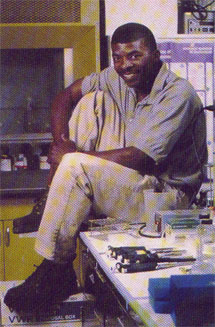
HIV affects proportionately more black people than it does white people.
Only one of the nation's primary investigators on an HIV research Project is black.
Patrick Allen has noticed the discrepancy.
Allen, a research associate at CU, is that black primary investigator. He's also starting a long term project maybe 30 years, he said, and maybe 50 - to bring black people: into biomedical research.
"In the last eight to 10 years, HIV has really affected the black community, and to not have any doing the research ... it definitely affects the work in the labs," Allen said. "I'm, trying to raise a black health-consciousness thing. You have to start somewhere, because if you don't, the legacy of health problems is just going to get worse."
It's a disturbing legacy already. The annual HIV infection rate for black men is six times that for white men, while the rate for black women is 14 times that for white womem and HIV is just one of several health problems America's black community is particularly vuenerable to.
Which is why Allen is trying to spark a national black biomedical research movement. He's contacted everyone from comedian Chris Rock to U.S. Surgeon General David Satcher, trying to enlist them in a long-term battle to raise awareness in the black community, both to encourage new researchers and to get black people just to think about their health.
"Black, people definitely know that blood sugar, blood pressure, various cancers, are big, big problems in the black community, but they're the least likely people to go to free health fairs," Allen explained. "You have to get them thinking like that."
So two years ago, he set out to change the way people think. It wasn't that he was hit by a thunderbolt, he said, but he realized that if he didn't do what he could things wouldn't get any better.
"I want the nation to say this is important, and for black people to realize it,' Allen said. "Just because you say it, black women aren't going to start getting mammogram screens, and black men won't just start checking their blood pressure."
"If you're black and you have kids they're going to have health
problems based on the kind of genes that we have."
-Patrick Allen, CU researcher
One reason that they won't is because the black community has historically distrusted the medical research community. Most recently, the nations attention was captured by details of the so-called Tuskegee experiments, which were conducted on black men with syphilis from 1932 to 1972. Those conducting the experiments deliberately withheld treatment from the men.
But that's just one example of a national legacy of abusive research on black people, Allen said. It has kept black people away from being researchers themselves, which in turn has created a sense of opposition.
That separation is what Allen is trying, to overcome.
"There aren't a lot of blacks in science, but if there were more, you wouldn't have so much of a feeling of "them against us?" he said. "Being a part of the scientific community, people ask me questions, and I don't respond the way they think I will because I'm black. They say, 'Wait a minute are you one of them or one of us?'"
Allen compares his fledgling efforts to those of women over the past few decades. Women have become doctors and researchers in greater numbers in the past 30 to 50 years, Allen said, and many of them have specialized in woman-specific fields like OB/GYN.
That's the model Allen said he has in mind, getting black people into his field and encouraging them to focus on health issues of particular concern to blacks.
"If you're black and you have kids, they're going to have health problems based on the kind of genes that we have, just like other groups have health problems based on their genes," he said.
And if this campaign works, Allen said, black people as a whole might start thinking about their health.
"I'm not asking all black pegple to become researchers. That would be ridiculous," he said. "I just want people to be conscious of their health."




















